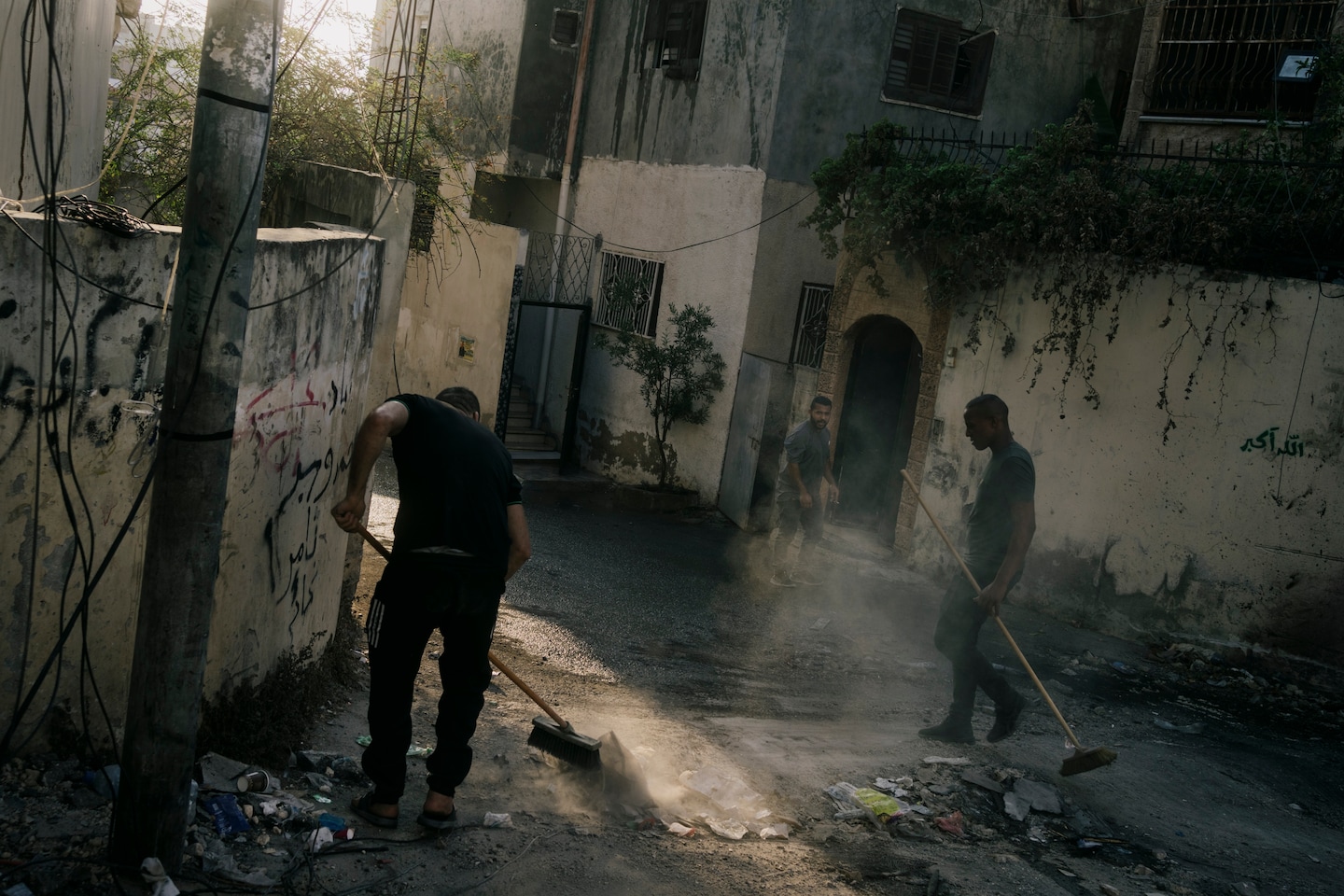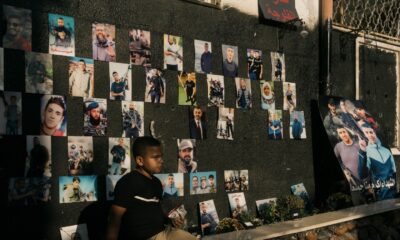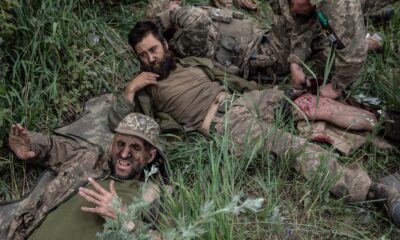English
One Family’s Perspective: Israel’s Military Operation Unfold in the Jenin Refugee Camp

[ad_1]
[July 9, 2023 at 1:00 a.m. EDT
Hussein Shibly casts his eyes towards the horizon from his humble abode, which bore the scars of the recent Israeli raid in the Jenin refugee camp in the West Bank. (Lorenzo Tugnoli for The Washington Post)
Comment on this storyComment
JENIN REFUGEE CAMP, West Bank — Hussein Shibly embarked on a journey homeward after the Friday prayers, traversing a city desperately striving to transcend devastation and merely embrace poverty. A bulldozer hoisted a mangled car whilst men patched up bullet-ridden holes in a rooftop water tank. Meanwhile, a fire engine diligently washed away the soot that tainted the crowded streets.
Upon reaching his family’s dwelling, Shibly ascended the stairs leading to a living room, now reduced to a charred cave by a shoulder-fired missile. Standing amongst the remnants of scorched couches and chairs, he questioned, “Is this a suitable habitat? Why have such afflictions befallen us?”
Shibly and his neighbors remain in a state of profound distress following Israel’s most extensive military operation in the occupied West Bank in decades – a two-day offensive that unleashed relentless firefights and air assaults upon these densely populated, steep streets.
Israeli forces launch a major operation in the West Bank city, claiming the lives of at least 8 individuals.
Israel deemed the assault on the Jenin refugee camp, a long-standing stronghold of armed Palestinian militancy, as a vital security measure – an effort aimed at eroding the strengthening terrorist foundation. Officials reported that at least 50 attacks within Israel this year stemmed from the camp. According to the Israel Defense Forces, the 12 Palestinians killed during the operation were all recognized militants.
However, for families trapped within the confines of the camp’s boundaries, it was an excruciating 44 hours of terror. While thousands of residents managed to flee, others found themselves confined to their bedrooms and bathrooms. Only a few experienced the breadth of horrors endured by the Shiblys.
Hussein, now 69, found solace in his customary late-night routine of watching television on Sunday. This routine was an outcome of years spent working the night shift at an Israeli meat processing plant. He was born within this camp, which houses at least 14,000 people, if not more, within an area measuring less than half a square kilometer. Poverty and unemployment run rampant here, just as Israeli commando raids do.
That night, rumors of an imminent, large-scale operation permeated the air. However, no one comprehended the magnitude of what was to come.
Around 1 a.m. on Monday, Hussein caught sight of a news report on Israeli television: IDF soldiers had entered the camp. Moments later, the sound of countless drones filled the air. “They are preparing to unleash their bombs,” he pondered. And then, an explosion resounded.
The Shibly family resides across nine apartments in three interconnected houses, owned by Hussein and his two brothers. They had grown accustomed to Israeli raids. Within minutes, scores of extended family members sought refuge in the basement.
Nearly 50 individuals huddled within the confined, dimly lit spaces that Hussein’s nephew, Fadi, utilized to breed parakeets. Gunfights raged outside, accompanied by the incessant fluttering and shrieking of these avian occupants. Throughout the night and all of Monday, the family anxiously listened and waited, resorting to candlelight once the power faded a few hours into the fray.
“The children were paralyzed with fear,” Hussein recounted.
However, Fadi, aged 34, grew increasingly anxious about his pregnant wife and 3-year-old son secluded within the cramped confines of the basement. Thus, he made the decision to remain in his second-floor apartment. With his family crouched low in a living room, Fadi stationed himself at a small bathroom window, serving as a sentry.
Perched high on a steep street, the Shibly compound commanded a panoramic view of the camp. From his vantage point, Fadi observed Israeli troops maneuvering below. Neighbors informed one another about the ongoing developments.
“‘Now they are entering Jaffar’s house,’” Fadi recollected. “‘Now they are raiding your cousin’s dwelling.'”
Close to 11 p.m. on Monday, the phone rang: “Fadi, they are coming for you.”
Fadi’s heart sank as he heard the commotion downstairs. Suddenly, the two doors of his apartment were violently flung open, their frames shattering instantly. Roughly 12 soldiers stormed in, donning body armor and illuminated by headlamps.
Fadi, his son inconsolably crying in his embrace and his wife clinging to his side, stood before them and implored in Hebrew, “Take it easy! Take it easy! There’s a little one here!” he beseeched.
“Show us your ID,” the leader commanded in Arabic. “Where are the terrorists hiding?”
The soldiers promptly extinguished the candles, restrained Fadi with plastic ties, and ordered the trio into the living room. Through the partially ajar door, they watched as the troops ransacked cupboards. One soldier took position at the spacious kitchen window. Within moments, he commenced long bursts of automatic rifle fire, causing bullet casings to cascade onto the tiled floor.
“For heaven’s sake!” Fadi exclaimed. “The child is petrified.”
Meanwhile, in the basement below, despair consumed the other family members. Fadi had ceased responding.
“We believed he had perished,” Hussein recounted. “The women screamed and wept.”
The relentless gunfire persisted. Fadi’s wife requested that she retrieve a toy for their child. A commander guided Fadi to a bedroom spilling over with plastic trucks and scooters. Upon noticing a toy machine gun placed near the door, the commander, infuriated, allegedly cursed, struck Fadi on the shoulder with the butt of his rifle, and forced him back into the living room.
Fadi and his family requested to join their loved ones in the basement. However, the commander staunchly declined their pleas, informing them that they would soon be departing.
At approximately midnight, loudspeaker announcements reverberated through the air: “Evacuate! Evacuate! You will find safety.”
The individuals in the basement scrambled to collect their essential documents and provisions, hastening to the courtyard where they encountered a firetruck, a Red Crescent team, and Fadi’s family. Tears streamed down their faces as they embraced, surrounded by their saviors. A medic promptly removed Fadi’s restraints.
“Aimlessly wander together,” advised a firefighter. “Men must assemble with the women and children to minimize the risk of injury.”
Nimbly navigating through the narrow streets, amidst the rubble and severed cables, they gradually made their way out of the camp. One particular thoroughfare bore resemblance to a plowed furrow on a farm, courtesy of Israeli bulldozers deliberately detonating explosives embedded within the pavement.
Once they transcended the camp’s boundaries, the family dispersed amongst the homes of relatives. Hussein remained fixated on the television, anxiously observing the unfolding events.
Late Tuesday, news reports depicted a shoulder-fired missile striking near the Abdullah Azzam mosque in Hussein’s neighborhood.
“It wasn’t the mosque that had suffered,” he remarked. “It was our house, devoured by the flames as I watched it on TV – a testament to the burning of my son’s beloved home.”
When he returned on Wednesday morning, a few hours after Israeli forces vacated the premises of the Jenin camp, the ruins of Fadi’s apartment continued to smolder, with bullet casings strewn across the area.
Hussein maintained that there was no justification for targeting their compound. None of the family members were affiliated with militant groups, nor were any of them wanted by the Israelis.
“We all possess valid work permits for Israel. They are well aware of who we are,” Hussein proclaimed, reminiscing about years spent laboring alongside Israeli Jews on a kosher-compliance team. Led by a rabbi, the team diligently monitored animal health conditions.
The Israeli military chose not to respond to requests for comment regarding the potential reasons behind the Shibly house being targeted.
As a surveillance drone loomed overhead on Friday, life slowly began to regain its place within the compound. Women busily prepared meals within Hussein’s ground-floor apartment, whilst Fadi tended to his surviving birds. Approximately 20 had succumbed to hunger during the incursion, he sorrowfully noted.
The United Nations issued an appeal for donors to assist in the reconstruction of Jenin. On Thursday, the United Arab Emirates pledged $15 million in support. Nevertheless, Hussein harbored skepticism.
“We hear stories of financial contributions via the news, but we never witness their implementation,” he skeptically remarked. Faith in any meaningful change occurring dwindled within him. Jenin would remain ensnared in poverty, and Israeli forces were bound to return.
“Return they shall,” Hussein declared. “They claimed their aim was to wipe out resistance in Jenin. Yet, they shall not succeed.”
[ad_2]





